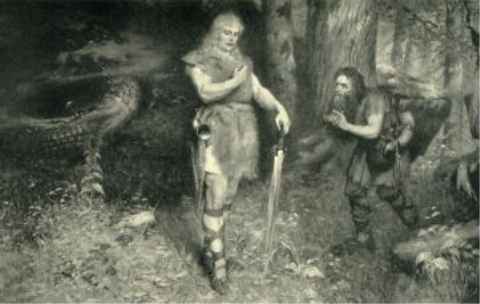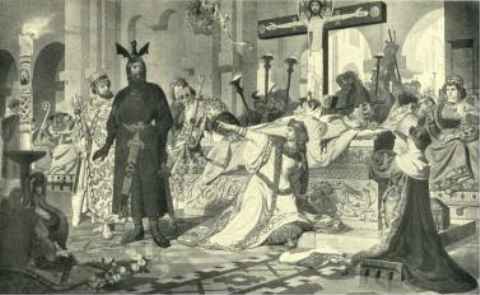Xanten
Siegfried

Siegfried
nach dem Kampf mit dem Drachen
Nach dem Gemalde von Leeke
Siegfried,
– and as we pronounce
this glorious
name,
the hero looks forth at us with shining eyes, for was not Siegfried the
perfect
embodiment of all that was beautiful and good?
For centuries stories have been told and poems
have been
sung of the bold adventures of the young hero, whose energy only found
satisfaction in victorious fights.
The original name of the small town on the lower
Rhine
now called Xanten, was "Ad Santos," "peace for the saints." It was thus
named
on account of the pious warriors of the Theban legion who in the fourth
century
had boldly died there for their creed finder their leader, Victor.
At the time to which our story refers, a mighty
stronghold
formed the centre of the little town Xanten. A king called Siegmund
with
his wife Siegelinde and their son Siegfried lived there.
While a mere boy, Siegfried had already a kingly
stature,
and an almost untamable disposition of mind. When he was only thirteen
years
of age, his longing for grand deeds was so great that he found it
impossible
to remain inactive at home. From old songs and legends which the
minstrels
recited in his father's castle, he had heard so much of bold adventures
and
brilliant exploits performed by his forefathers, that he was most
anxious
to follow in their steps. He felt strong and valiant enough to
undertake
like the heroes of old, dangerous journeys. Therefore young Siegfried
left
one day his ancestral halls, and wandered southwards along the clear
blue
river. He soon found an opportunity of testing his courage.
At the foot of the Seven Mountains lived a
celebrated
armourer called Mimer, renowned for making excellent swords. Our hero
liked
this warlike trade, and he asked the master to receive him as an
apprentice,
that he might learn the praiseworthy art of forging a good sword for
himself.
The armourer agreed, and Siegfried remained at Mimer's workshop. The
journeymen
with whom the youth had to work, soon learned the enormous strength of
their
new companion. The boy, often not knowing how to give expression to his
desire
for action, would take up his fellow workmen, lift them high into the
air,
and drop them, not always softly to the ground. Or when his anger was
roused,
he would imprint black and blue marks on their backs with his strong
fists.
Once he even smashed with one stroke of his hammer all the iron bars in
the
armoury, and knocked the anvil into the ground with a mighty blow.
Mimer looked on with dismay, amazed at the boy's
almost
supernatural strength, but fearing that Siegfried's wrath might some
time
turn against him, he thought to rid himself of his dangerous
apprentice,
and conceived a cunning plan to kill him. A horrible dragon lived in
the
neighbouring forest, which tore every wanderer to pieces who chanced to
cross
its way. Mimer ordered Siegfried to fetch a sack from the
charcoal-burner
in that forest, well knowing that the boy would never return thence.
The youth, without knowing the danger he was about
to
meet, went cheerfully on his way. In the middle of the thick wood he
kindled
a charcoal-kiln, and amused himself by putting big burning branches and
young
trees into the fire.
Suddenly the monster came swiftly creeping on its
huge
claws. Curving its shimmering body the ugly beast opened wide its jaws
to
devour the young charcoal-burner. Siegfried's eyes brightened up at the
prospect
of an encounter with the terrible animal before him. Without a moment's
hesitation, he tore a flaming beam out of the kiln, and pushed its
burning
end deep into the open mouth of the dragon. Rearing with pain the
monster
turned round beating violently with its prickly tail, trying in its
agony
to crush Siegfried. But he, jumping skilfully aside, rapidly dealt it
heavy
blows, and succeeded at last in smashing its head with a large piece of
rock.
He severed the head from the body, and threw it into the blazing
flames.
To his astonishment he observed how a stream of grease gushed from the
burning
pile, and collected in a pool at his feet.
Close by the charcoal-kiln stood an old lime-tree.
A
little bird sang merrily in its branches. Siegfried, involuntarily
listening
to the clear strain, made out the following words: "If you would be
covered
with horn, and become invulnerable, undress yourself and plunge into
the
pool."
Siegfried quickly threw his clothes ,off and
anointed
his whole body with the dragon's grease. While thus occupied a leaf
from
the old lime-tree above dropped between his shoulders. This part of the
hero's
body remained without horn. When he had finished, he took up the
monster's
head and returned to Mimer's work-shop. The nearer he got to the
smithy,
the more his rage against his wicked master increased. Mimer had seen
the
boy from afar approaching with the trophy of his fight, and had hidden
in
great fear.
Siegfried however soon found him out and slew him
on
the spot. Then he forged a good two-edged sword and shining armour for
himself,
and having saddled the best horse of Mimer's stable, he left the smithy
to
look for new adventures.
For a long time he travelled aimlessly about, saw
mountains
and valleys, rivers and lakes, cities and hamlets, until he at last
arrived
at the seashore. He embarked with his good horse, and was cast by a
gale
on the rocky coast of an unknown country. The noble animal climbed
courageously
up the stony beach, and carried its rider to an enchanted castle which
was
surrounded by a wall .of flames. For a moment Siegfried stood
irresolute.
Suddenly the voice of the little bird sounded again above him, "Break
the
charm. Straight into the flames with a bold dash. A most lovely maiden
wilt
be thy reward."
The youth took courage, spurred his steed, and
with a
plunge horse and rider disappeared in the flames, which were at once
extinguished. The charm was broken. Before him lay a wonderful castle.
Siegfried
penetrated into its interior, and was amazed to find every living
creature
in a profound sleep within; the horses in their stalls, the grooms in
the
stables, the cook at the hearth. When he entered the high hall a lovely
scene
presented itself to his view. On a couch the most exquisite form of a
woman
lay sleeping. Her golden hair was strewn with precious stones, and her
limbs
were clothed in the most costly garments.
The young hero looked for a while, lost in
admiration.
Then bending down to her, he pressed a passionate kiss on her rosy
lips.
Brunhilde, the fair sleeper, opened her eyes, and at the same time
every
living being in the castle awoke.
The old legend depicts in glowing colours the
sweet hours
of love that followed for Siegfried and Brunhilde. Days and months
passed
by without the lovers being aware of it. However fond of adventures
Siegfried
was, he felt himself chained to the spot by her subtle charms. While
thus
undecided he heard one day the bird's voice: "Leave the castle and give
up
a life of ignoble leisure; direct your steps towards the country of the
Nibelungen, take possession of their immense treasures and of the
precious
invisible cap."
At the prospect of new adventures Siegfried could not be
kept
back any longer by Brunhilde. They parted with the solemn promise of
meeting
again.
A great many exploits are recorded of the proud hero which
he performed in the country of the Nibelungen. After a long and hard
struggle
with the cunning dwarfs, he took away with him their treasure, as well
as
the cap which had the gift of making its wearer invisible.
Years had passed by, and Siegfried longed to see
the
place of his childhood again. So he turned homewards and reached Xanten
after
many adventures. The joy of his noble parents at seeing their valiant
son
again was indescribable.
The legend of Siegfried's youthful exploits and
his
home-coming is full of romance and happiness. But if we listen to the
continuation of his story we shall find how every human feeling has its
place
in the hero's biography, great joy, deep sorrow, passionate love,
glowing
hatred, heroism and perfidy, cowardice and high courage, until at last
the
legend of Siegfried ends in a pitiful wail of grief.

Siegfried auf der Totenbahre
Nach dem Gemalde von Emil Lauffer
Click
 to go to the next
section of
the Legends of the Rhine to go to the next
section of
the Legends of the Rhine
|

